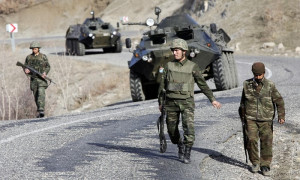
It would sound a bit simplistic to suggest that the operation has been started as a result of Turkey anticipating a deal between the US and Russia over Syria that may also include a viable Kurdish territory in place, if not an independent state. This is evident from the fact that despite having officially ended its Operation Euphrates Shield in the last week of March 2017, Turkey did not reduce its military presence. On the contrary, it went to enhance its military activities between Azaz and Al Bab. Some reports had emerged, quoting Turkish officials, in May stating that Turkey was considering establishing military bases in Al-Bab, close to the newly set target city of Iblid.
According to other reports, Turkey’s purpose behind its fresh military operation in Syria is to insert itself more deeply in the “de-escalation zones” agreed to during the Astana talks between Russia, Turkey and Iran. By doing that, Turkey wants to create fresh forces, composed of “locals” that it can use to its advantage when the push comes to shove. This was precisely the objective behind establishing different sorts of military bases during the operation Euphrates Shield.
The other main objective behind fresh deployment of Turkish troops and the alert message sent to 2000 fighters of Free Syrian Army is to take advantage of the situation prevailing in Syria where the US and Russia, despite agreeing to a cease-fire, remain largely entangled. Turkey has been feeling particularly emboldened since the US shot down a Syrian jet to protect units of Syrian Democratic Forces. According to Turkish media reports, Turkish political elite has seen in this situation an opportunity to start its own operation against the US backed Kurdish forces, hoping that Russia and Syria, naturally offended by the US action against Syria, would silently support it.
While assorted speculation about Russia turning blind eye to Turkish operation continue to prevail, Turkish President Erdogan minced no words when he came out with a statement directly targeting the Kurds. “The PYD and the YPG are trying to achieve something. They should know that no matter who is behind them, Turkey will never allow establishment of a [Kurdish] state in northern Syria,” he said.
The purpose of the new operation is, therefore, to break up the corridor the Kurds have carved out and Turkey intends to do so by crossing into Syria from three different yet close locations and establish control over an area 35 to 85 kilometres. This area, or the new Turkish corridor, would start, as some reports have indicated, from Daret Izza and extend to Obin and Khirbet al-Joz. Another area of land, starting from Turkey’s Hatay border and extending 35 kilometres to Sahl al-Ghab, would also be controlled by the Turkish forces, duly supported by FSA fighters.
As stated earlier, Turkey’s actual objective in Syria since the beginning of its direct and indirect involvement has been to change Syria’s geo-ethnic landscape. It has seen its various manifestations in the form of Turkey pushing for removing Kurdish force well behind the Euphrates River, thus vying for space that it can use to ‘shield’ itself against a possible Kurdistan.
Given the objective and given the way Turkish involvement has seen a startling increase in Syrian since the beginning, end and then re-commencement of military operations, one can argue that Turkish military-roll in Syria would not just end with the capture of Iblid. What adds particular substance to this possibility is the large presence of Kurds in areas other than the intended Turkish targets. Will then those areas also see a Turkish assault?
We can put an answer to this question in a different way. Turkey will continue to push for more and more territory unless it has enough space under its control that it can use to a) thwart the establishment of Kurdistan, and b) use that very space to fill with millions of refugees who have been living in Turkey since 2011-12. Only by filling the Syrian territory by the Syrian refugees, who are not ethnic Kurds, can Turkey most effectively counter Kurds and effect a potential geo-ethnic alteration that has become increasingly possible due to massive dislocations and displacements caused by the war. Therefore, the new assault, which started on the Afrin countryside on June 27-28, hopes also to eject the Kurds from the city of Tal Rifaat, located roughly 40km north of Aleppo. Turkey claims it too is becoming an incubator for ‘Kurdish militancy.’
A large scale military showdown between Turkish military forces and SDF is therefore imminent and likely to escalate. This is what Kurdish components of SDF are expecting to see once the fight against ISIS nears its end. For Syria however, this would be the last thing its people would expect once the fight against ISIS draws to an end and international shifts towards post-war re-construction of the country. Notwithstanding Turkish intentions, a lot for its success would depend upon how Russia and the US go along with the cease-fire and effect new configuration for the future of Syria.
Salman Rafi Sheikh, research-analyst of International Relations and Pakistan’s foreign and domestic affairs, exclusively for the online magazine “New Eastern Outlook”.
